MEDIA ADVISORY
Kigali to host 14th Gender Summit on 19-20 March 19-20
Global experts meet in Kigali to discuss climate change through a gender lens, and the impact on economic and societal issues
KIGALI, Rwanda, 16 March 2018, -/African Media Agency (AMA)/-
THE STORY: It is essential to build a science base and research capacity in Africa for the benefit of the local and global population. Contingent on the success of this are important components of our daily life and of our future: climate change, health, food security, energy, urban planning and transport, to name a few. While there has been progress made in scientific knowledge over the last century, it has not yet delivered equal quality of knowledge and outcomes for both genders. Much still needs to be done to advance policies for solutions in science.
“50% of drugs have different adverse effects in women and men but more than 75% of biomedical studies use male subjects only which means we don’t understand why drugs can be more toxic to women”
“96% of ecosystem studies do not look at sex differences in the populations which means we don’t know how climate change will affect the natural environment and biodiversity”
“Women have 47% higher risk of injury in a car crash but all cars are tested on male crash test dummies – there are no female crash test dummies”
We need women and men in science because gender balance in teams improves collective intelligence of the team, produces more balanced assessment of risk and more effective problem solving when things go wrong, and achieves better communication and understanding of the problem’s context.
The economic, societal and human well-being benefits can only be achieved if there is commitment by all stakeholders to use the best scientific knowledge when formulating solutions that ask: Will these interventions work equally well for women? Will they work equally well for men? Examining science through the gender lens requires a global dialogue.
WHAT: Gender Summit 14 – Africa is organized by African Institute for Mathematical Sciences, in partnership with leading science institutions across Africa. The 2-day event focuses on the effects of Climate Change. Titled “Climate Change through the Gender Lens: Focus on Africa” the program comprises six plenary sessions and four parallel sessions structured around: Advancing Gender Sensitive Climate Change Research and Advancing Gender Sensitive Climate Change Education. There is also a poster exhibition, professional networking activities, and interlinked public engagement side-events.
Topics of discussion include:
- Strengthening co-operation between key actors in and outside the science landscape in Africa;
- Connecting the reality of the UN Sustainable Development targets with technological advancements, and the vision of the 4th Industrial Revolution and;
- Scientific knowledge base and application in the context of priority political and policy drivers.
WHY: The overarching mission of The Gender Summit is Quality Research through Equality with the aim of reaching consensus, based on scientific evidence, on where improvements to science knowledge and science practice are needed and who should act. Applying the gender lens helps improve research excellence and create opportunities to ask new questions, create sustainable technological innovations and provide better knowledge for development measures.
This is particularly critical now because of the targets of the UN Sustainable Development Agenda and the importance of the gender issue across all Sustainable Development Goals, SDGs, and not just SDG 5, which deals with empowerment of women and girls as a social goal. The goals of Africa 2063 and the CESA policy agenda also need to be subject to gender analysis to ensure that best research is produced in Africa, for Africa.
INTERVIEWS: Speakers at GS14 will include leading researchers from African countries, global experts, leaders in innovation, influential policy makers and champions of evidence-led sustainable, socio-economic development. Available for scheduled interviews are:
- Mr. Thierry Zomahoun, President and CEO, AIMS Global Network
- Dr Elizabeth Pollitzer, Director, Portia
- Dr. Yvonne Mburu, Founder and CEO, Med In Africa, France
- Ms. Karen Craggs-Milne, Global Group Director, Gender Equality, Inclusion & Business Development, AIMS Global Secretariat
- Ms Fatou LO, Country Representative, UN Women, Rwanda
- Mr. Boubakar Yougbare, African Union International Centre for Girls and Women’s Education
WHEN: March 19th and 20th, 2018 from 9:00 a.m. to 5:00 p.m.
WHERE: Kigali Marriott Hotel, KN 3 Avenue, Kigali, Rwanda+ 250 222 111 111
Distributed by African Media Agency (AMA) on behalf of African Institute for Mathematical Science (AIMS).
MEDIA CONTACTS:
Kigali
Evangelina Soni Kayinamura
Clarity Communications
media@communicateclarity.com
+250 788 830 629
New York
Flor Estevez Clarity
Clarity Communications
media@communicateclarity.com
+1 917 488 8626


